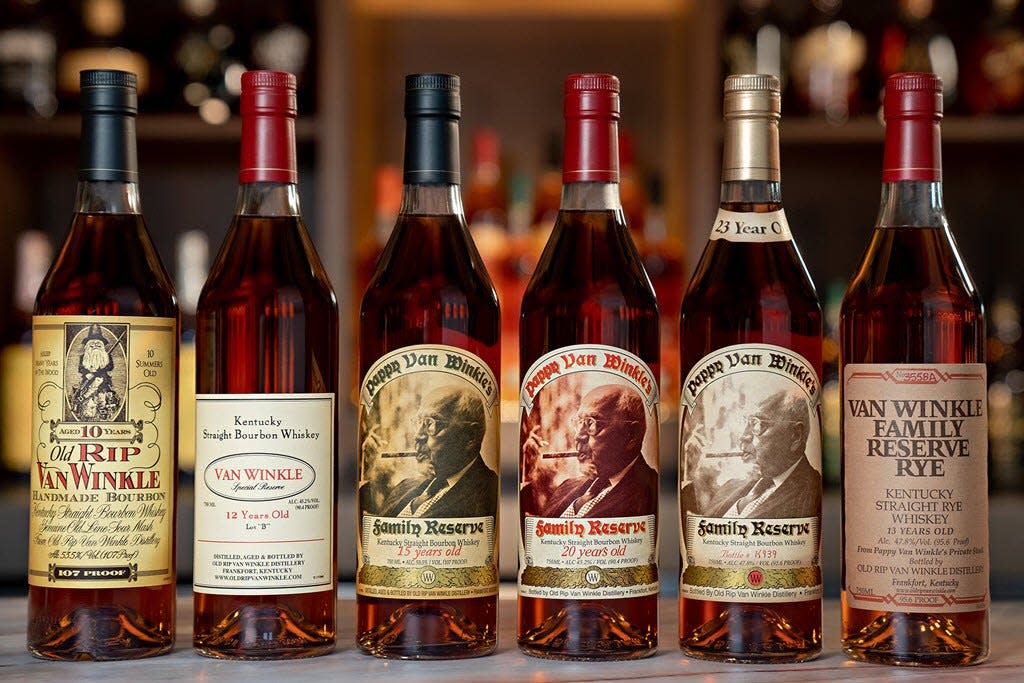No criminal charges for OLCC employees in rare bourbon scandal, Attorney General announces

This story was updated at 2:40 p.m.
The Oregon Department of Justice will not pursue criminal charges against Oregon Liquor and Cannabis Commission employees for diverting coveted bottles of rare liquor for themselves and lawmakers, assistant Oregon Attorney General Lisa Upland said in a letter Monday to Gov. Tina Kotek.
The OLCC had a "long-standing agency practice" where an OLCC employee could request a specific product be transferred to a liquor store for personal purchase, according to the report attached to Upland's letter. This practice predated the 2018 "Chance to Purchase Program," a lottery-style program that allows the public to win the option to purchase highly sought-after liquor. One employee interviewed said the practice was in place before she joined the OLCC 30 years ago.
The DOJ investigation determined there was no specific written policy prohibiting or permitting the internal distribution practice or training to advise employees not to engage in the practice.
An ethical review of employees' conduct is underway by the Oregon Government Ethics Commission, with documents and reports from the criminal investigation available to the commission.
A DOJ investigation was initiated in February 2023 after an internal investigation revealed top leaders at the OLCC used their positions to divert rare bottles of bourbon for at least eight years.
Six OLCC employees, including then executive director Steven Marks, were identified in the initial investigation as participants. Marks resigned after Kotek asked for him to step down. Craig Prins, inspector general for Oregon's Department of Corrections, was appointed interim director following Marks' resignation.
Thousands of documents, 40 interviews in OLCC investigation
According to the report by the criminal justice division, more than 40 people were interviewed during the investigation, including former and current commission employees, associates of employees, OLCC commissioners, liquor store agents, employees, personnel, legislators, and citizens who filed complaints.
She said investigators also reviewed more than 10,000 OLCC internal documents, reports and emails.
“It is critical that Oregonians have trust in our state agencies, their leaders and employees. I am pleased with the thoroughness of the investigation and the professionalism demonstrated by our DOJ team, led by CJ [Criminal Justice] Chief Counsel Slauson, and including AAGs Kurt Miller and Toby Tingleaf, and Special Agents Vince Cui and Keri Jasso,” the release said.
Agents determined multiple OLCC employees, including individuals who also were subjects of the OLCC internal investigation, would occasionally ask the acting OLCC distribution center manager to send a certain bottle of liquor to a specific store for them to purchase. The OLCC distribution manager would then contact a liquor store to advise employees that the product was being sent for a specific customer.
The criminal justice division report said the manager could not provide details of a specific instance where a requested product was routed to a particular OLCC employee.
The report by the Department of Justice said business records revealed one liquor store near an OLCC office was often used to facilitate this kind of purchase. The report did not name the store, which transferred ownership after the dates being investigated. The new owners did not have the inventory or point-of-sale data related to the investigation.
Interviewing the prior liquor agent, prior owner and employees of the prior owner also provided no specifics or details for any transaction involving an OLCC employee, the report said.
"We found that the evidence available to us supports a conclusion that some employees used their positions to obtain high demand, difficult to find, liquor for themselves or others, but that same evidence fell short of establishing the particulars of any instance in which an employee did so," the report concluded.
The criminal justice division also sued for the bank records of some OLCC employees to attempt to track purchases in reverse, according to the report. Agents, however, were unable to identify a specific liquor purchase directly related to a requested transfer when reviewing those financial records.
No criminal charges warranted, Oregon DOJ concludes
The DOJ report said the investigation determined evidence "plainly" supports two elements of first-degree official misconduct but proof that employees' actions were "factually unauthorized" or that they knew the conduct was unauthorized is not as clear.
"Even though the employees’ behavior may have breached ethical standards, there is no explicit policy prohibiting the specific conduct, we found no evidence of relevant training, and the practice appears to have been longstanding and endorsed by at least one executive director," the DOJ report said.
Upland's letter said that has since changed. The letter said the DOJ was aware of and supported the OLCC’s decision to adopt a policy prohibiting employees from the internal diversion practice. Upland said they also supported providing ongoing training to OLCC employees on ethical obligations.
OLCC spokesperson Matthew Van Sickle said the agency enacted the policy in May 2023 and employees attended a mandatory ethics training session conducted by the Oregon Government Ethics Commission in August 2023.
"OLCC will use the DOJ report to continue to improve the agency’s policies, processes, and procedures," Sickle said.
"In light of our responsibility to prove each element of a criminal offense beyond a reasonable doubt and the sufficiency of the evidence currently available to us, we have determined that criminal charges are not warranted," the DOJ investigation said.
Dianne Lugo covers the Oregon Legislature and equity issues. Reach her at dlugo@statesmanjournal.com or on Twitter @DianneLugo
This article originally appeared on Salem Statesman Journal: Oregon DOJ concludes criminal investigation into rare bourbon scandal

